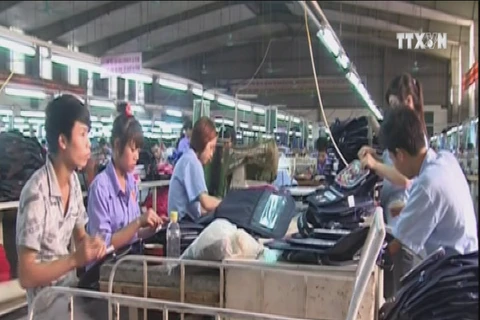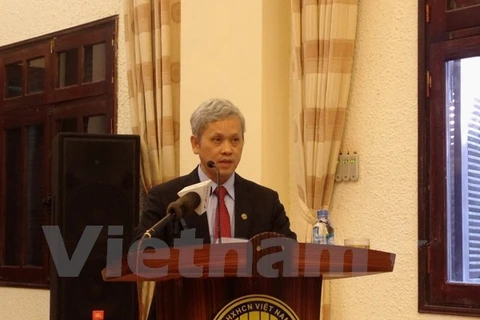Hanoi (VNA) - Vietnam has posted the highest regional increase in minimum wages over the last three years, more than Indonesia and China, but workers still struggle to make ends meet.
Things are not likely to change with the latest increase, set to take effect next month, local reports said.
From July 1, the basic salary for civil servants and public employees will increase seven percent to 1.3 million VND (about 57.2 USD) from the current 1.21 million VND.
The new basic salary, used for calculating payrolls and allowances, will apply for public officials, public employees working in State agencies and civil service providers of the Party or the Government, State-funded socio-political organisations and the armed forces.
Le Dinh Quang, deputy head of the Labour Relations Department of the Vietnam General Confederation of Labour, said that the government had plans to increase minimum wage for employees every year to improve living standards.
However, the current minimum wage increase only met 90 percent of the minimum living standard needs of workers and their families.
Even workers of businesses that pay higher than the minimum wage, 4-5 million VND per month, face many difficulties in daily lives.
An overwhelming majority of workers, 97 percent, did not want to work overtime, but had no choice but to do so, just to make ends meet, Quang told the Hai Quan (Customs) newspaper.
The newspaper reports that from 2014 to 2016, Vietnam had the highest regional minimum wage increase of nearly 14 per cent, against seven percent in Indonesia and 10 percent in China.
Many people wonder why such an increase is unable to meet workers’ demands, the report says.
The reason is that Vietnam’s minimum wage is only higher than Laos and Cambodia and lower than most countries in Southeast Asia like Thailand, Malaysia or Singapore, it explains.
The real wage of workers is still very low, it is not high enough to cover workers’ basic needs because the costs of many services also increase along with the minimum wage.
In fact, in some enterprises, the real income of workers reduces when the minimum wage increases.
Some business owners also threaten to cut their workforce if production costs increase because of higher wages.
The results of study by the ISEAL Alliance – the global association for sustainability standards and social accountability – released at a seminar in Hanoi recently showed that an employee in HCM City must be paid more than 6.4 million VND a month to meet their daily expenses.
The salary was calculated by the research team on the basis of what a household of two adults and two children spend a month.
Unfortunately, the average salary of a worker in the garment sector, a major employer, is just over 4.8 million VND a month.
According to the study, at a monthly wage of 6.4 million VND, an employee may save 488,000 VND per month, five percent of the income after spending for food, housing fee, insurance and other needs.
The study estimates that for rural areas, in two surveyed provinces of Soc Trang and Thai Binh, a worker needs at least 3.99 million VND a month, but the current average salary in these localities is just 3.2 million VND.
Most employers pay only minimum wage, which is not enough to meet actual minimum living costs, forcing workers to work overtime to make ends meet, the study found.
Workers are, therefore, left wondering if and when they will be able to meet daily expenses and save some money for a rainy day.
Bui Sy Loi, Vice Chairman of the National Assembly’s Social Affairs Committee, said the minimum wage must be adjusted based on socio-economic development and workers should be compensated in accordance with market mechanisms.
Currently, the minimum wage is based on food prices, which is inadequate. Therefore, authorised agencies must re-calculate the minimum wage so as to ensure the benefits of employees, especially when they retire, while creating favourable conditions for business growth, he said.-VNA
Things are not likely to change with the latest increase, set to take effect next month, local reports said.
From July 1, the basic salary for civil servants and public employees will increase seven percent to 1.3 million VND (about 57.2 USD) from the current 1.21 million VND.
The new basic salary, used for calculating payrolls and allowances, will apply for public officials, public employees working in State agencies and civil service providers of the Party or the Government, State-funded socio-political organisations and the armed forces.
Le Dinh Quang, deputy head of the Labour Relations Department of the Vietnam General Confederation of Labour, said that the government had plans to increase minimum wage for employees every year to improve living standards.
However, the current minimum wage increase only met 90 percent of the minimum living standard needs of workers and their families.
Even workers of businesses that pay higher than the minimum wage, 4-5 million VND per month, face many difficulties in daily lives.
An overwhelming majority of workers, 97 percent, did not want to work overtime, but had no choice but to do so, just to make ends meet, Quang told the Hai Quan (Customs) newspaper.
The newspaper reports that from 2014 to 2016, Vietnam had the highest regional minimum wage increase of nearly 14 per cent, against seven percent in Indonesia and 10 percent in China.
Many people wonder why such an increase is unable to meet workers’ demands, the report says.
The reason is that Vietnam’s minimum wage is only higher than Laos and Cambodia and lower than most countries in Southeast Asia like Thailand, Malaysia or Singapore, it explains.
The real wage of workers is still very low, it is not high enough to cover workers’ basic needs because the costs of many services also increase along with the minimum wage.
In fact, in some enterprises, the real income of workers reduces when the minimum wage increases.
Some business owners also threaten to cut their workforce if production costs increase because of higher wages.
The results of study by the ISEAL Alliance – the global association for sustainability standards and social accountability – released at a seminar in Hanoi recently showed that an employee in HCM City must be paid more than 6.4 million VND a month to meet their daily expenses.
The salary was calculated by the research team on the basis of what a household of two adults and two children spend a month.
Unfortunately, the average salary of a worker in the garment sector, a major employer, is just over 4.8 million VND a month.
According to the study, at a monthly wage of 6.4 million VND, an employee may save 488,000 VND per month, five percent of the income after spending for food, housing fee, insurance and other needs.
The study estimates that for rural areas, in two surveyed provinces of Soc Trang and Thai Binh, a worker needs at least 3.99 million VND a month, but the current average salary in these localities is just 3.2 million VND.
Most employers pay only minimum wage, which is not enough to meet actual minimum living costs, forcing workers to work overtime to make ends meet, the study found.
Workers are, therefore, left wondering if and when they will be able to meet daily expenses and save some money for a rainy day.
Bui Sy Loi, Vice Chairman of the National Assembly’s Social Affairs Committee, said the minimum wage must be adjusted based on socio-economic development and workers should be compensated in accordance with market mechanisms.
Currently, the minimum wage is based on food prices, which is inadequate. Therefore, authorised agencies must re-calculate the minimum wage so as to ensure the benefits of employees, especially when they retire, while creating favourable conditions for business growth, he said.-VNA
VNA
























